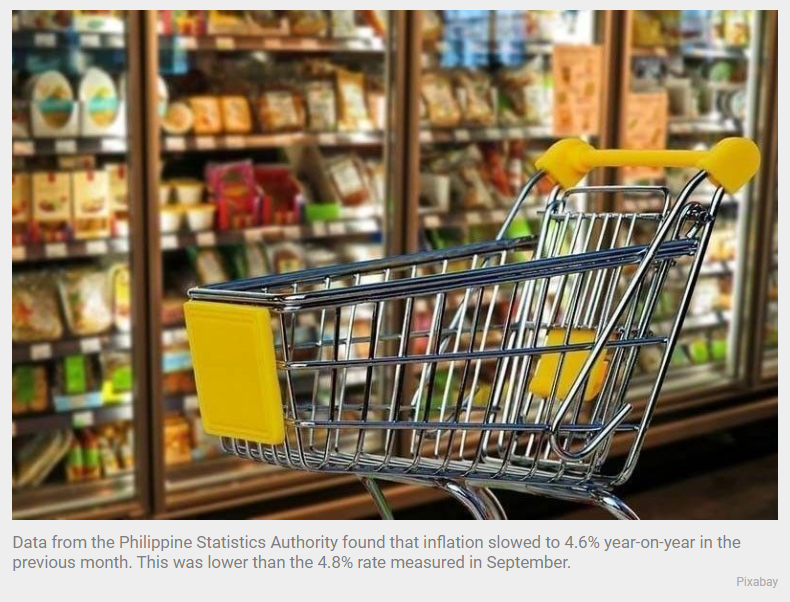Philippines: Inflation decelerates in October amid lower food prices
MANILA, Philippines – Inflation cooled in October as food prices eased as the economy begins a long-winding process of recovering from a historic economic meltdown.
Data from the Philippine Statistics Authority found that inflation slowed to 4.6% year-on-year in the previous month. This was lower than the 4.8% rate measured in September.
Inflation, as measured by changes in the consumer price index, witnessed this downtrend as the food prices decelerated around the country, especially in Metro Manila.
The PSA’s food index reported prices of food, such as vegetables, fish, and meat, lowered by 5.6% in October, considering the effects of African swine fever and weather damage from storms linger. Last year, this was at 2.1% in October.
On a monthly basis, the prices of food in the National Capital Region did not increase as fast compared to past months. Broken down, meat inflation in October slowed to 7.5% from 14.4% in the preceding month, while the prices of vegetables decelerated to -0.5% and fish prices inched down 9.8% from 10.3%.
Despite lower food prices, fuel has risen considerably in the past months as oil-producing countries increased costs on account of higher demand, among other reasons. The prices of petroleum products and fuel soared by 32.9% in October, higher than the 21.3% increase in September. According to national statistician Claire Dennis Mapa, this was one of the increases his seen in past years.
“The inflation of petrol products are often negative. It only increased in March this year now it’s at one of the highest for the year. There were other years that it was this high, such as in 2018,” he said in an online briefing.
Latest data found public transport costs rose by 7.1% in October.
Within areas outside Metro Manila, the PSA observed inflation inched down to 5%, lower than the 5.2% pace in September.
Year-to-date inflation is now at 4.5%, according to the Bangko Sentral ng Pilipinas. This still landed above the central bank’s 2-4% goal for this year.
However, latest inflation print landed at the lower band of the central bank’s forecast range of 4.5-5.3% for the month.
“The private sector’s inflation expectation is also consistent with inflation reverting back to the target by 2022. The BSP remains of the view that supply-side price pressures are best addressed by timely non-monetary interventions that could ease domestic supply constraints,” BSP Gov. Benjamin Diokno said in a statement.
Poor Filipinos, however, are still feeling the price crunch from the pandemic-induced recession even as inflation for bottom 30% households declined to 4.8% year-on-year from 5% in September. In October 2020, this was at 2.9%.
Concerns surrounding inflation as transitory remain, especially as the PSA high prices could possibly be due to supply concerns. Michael Enriquez, chief investment officer for Sun Life Investment Management and Trust Corp., said prices would go down as soon as mobility restrictions are relaxed.
“I believe so because the cause is really on supply disruptions. Once the government continues to ease the mobility restrictions, we can expect the supply congestions to normalize and bring down food prices,” he said in a Viber message.
For Nicholas Antonio Mapa, senior economist for ING Bank in Manila, inflation caused by supply-side concerns is transitory in a way.
“Once the supply issues have been addressed, inflation for that particular items tends to fade and dissipate rather quickly. Thus in a way yes it is transitory,” he said in an email exchange.
But the inflation that the Philippines has experienced since the onset of the pandemic was due in part to the disruption of the supply chain globally and locally.
“But since we’re seeing supply bottlenecks affecting different parts of the CPI basket, overall inflation tends to be viewed as not transitory. The key here is addressing the supply shocks because if these shocks persist across the board, inflation will remain elevated, which can in turn lead to second round effects (wage and or transport fare adjustments). In such a case this is when BSP will have no choice but to act,” he added.
Source: https://www.philstar.com/business/2021/11/05/2139193/inflation-decelerates-october-amid-lower-food-prices


 Thailand
Thailand




